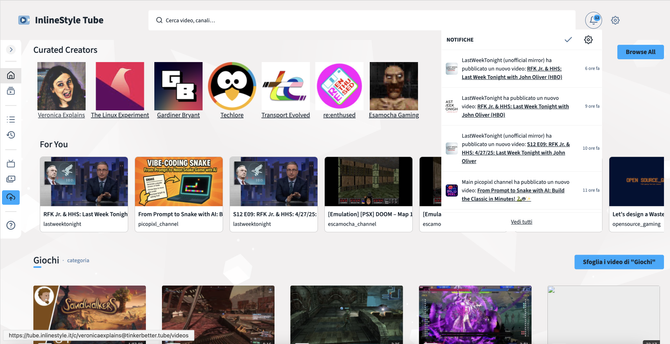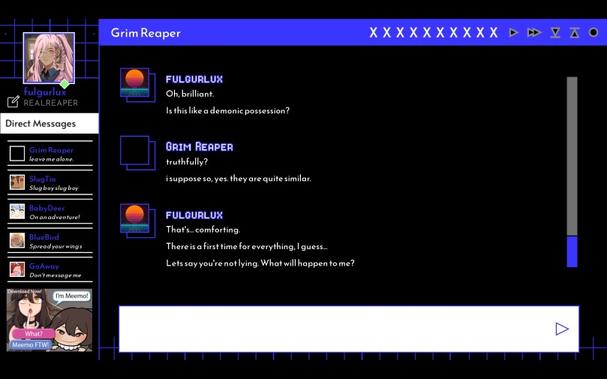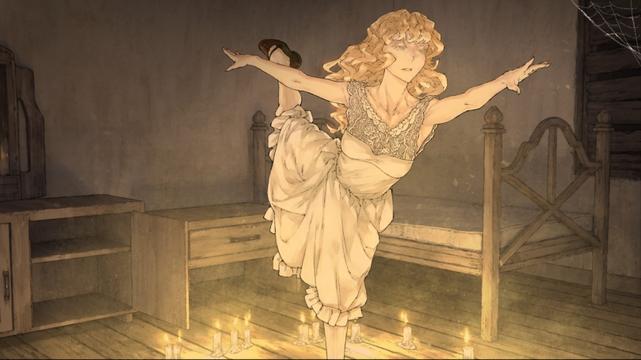When I play games on Steam I tend to naturally drift away from JRPGs. My Switch collection is so exclusively focused on those delightful Japanese games that I tend to forget that there’s so much delight to be found in games created in other places. There’s a striking difference between the way stories are told in Japanese visual novels (VN) and those created in Western parts of the world. Also, I enjoy how a short story created by an European, American or Australian indie studio (just to give some examples) can be much more relatable than a 50h visual novel created in Japan. Well, this is hardly surprising personally, but I only notice the breath of fresh air when I experience it. I’m sure there are Japanese visual novels in the same vein, indie titles made by inclusive people, with non-normative relationships (LGBTQ+ or not) exploring a variety of scenarios in a non-superficial mainstream way that don’t make their way into the West for lack of resources. I’m still unsure if the yuri VNs I enjoy so much are made with a lesbian audience in mind. Spoiler alert, many aren’t. Anyway, I’ve only slept 3 hours and I’m rambling. What I want to say is that in a Japanese game you can hardly call your boyfriend “baby girl.” Even in the two otome visual novels I’ve played (but didn’t finish) the guys are designed as those uptight princesses, but they act and behave like a man from the 50s. I don’t know why people spend 30 hours of their life reading that crap and unlocking routes from asshole to asshole. “Oh, I love that character who said that I didn’t need plastic surgery when we first met!” I want my money back. I’m glad I didn’t even pay for one of those VNs I played for like 5 minutes. It’s not that I don’t like the stories, but they’re obviously made with a target audience in mind. I’ll still continue punishing myself and consume content that was created within another set of principles just as an experiment on why it is so important the matter of self-identification with something to a certain extent. How we naturally engage with content that we feel was made for us and perceive content that wasn’t with a bias that hinders its enjoyment. To plunge into anything that wasn’t made for me is something I like to practice within reason, just not for 30 hours.
Welcoming demons in A Date With DeathI’ve been enjoying these simulation games that play almost entirely inside a computer interface, a bit like Needy Streamer Overload. I downloaded a game called A Date With Death that is a bit along these lines. It’s a free game on Steam but we can buy a DLC to support the devs. It’s a cute chatting and dating sim where we are hacked by none other than the Grim Reaper saying he has come to collect our soul. We can troll him and tease him a bit, and call him “baby girl” because he’s extremely cute. He’s a powerful and productive reaper who has a plushie in his room called Azrael. The end-game is romance of course but it doesn’t feel forced, creepy, abusive or sexist. The player can do other things in the game like petting a cat (as one should), watering a plant and listening in on the neighbours from behind the apartment door. Inside the in-game PC there’s also a program to draw and to play videogames, and shortcuts for wallpapers, art and music. The character creator is diverse in terms of sex, gender and appearance. The game loop focuses mostly on petting the cat, watering the plant, listening to the neighbours and chatting with Grim Reaper through the computer interface. Like a VN, some choices will determine which ending we get. Grimmy is not like a man from the 50s, he’s just himself, beyond all types. Hell, I don’t even know how he identifies and that doesn’t matter at all. It’s a dating sim without all the crap and I enjoyed it for its simplicity. As a side note, since the game has a little program to draw, the community posts on Steam are packed with beautiful fan art made by talented people. I tried my hand at it but didn’t publish. I blame the mouse!
Althea dancing in Rituals in the DarkRituals in the Dark, a visual novel created by ebi-hime, is a short story contained in a neighbourhood in Scarborough, England. It focuses mainly on two characters – Aspen and Althea – and Aspen’s friends, Pipa and Lakhi. However, the story is not very character-driven – it’s more descriptive. Before Aspen does anything, she stops and reminisces about her life and relationships and about the people around her. As the reader, we are provided with a good psychological portrait of everyone involved and this also includes the characters that appear in the margins. Do you remember when you were little and had to visit old family members or old neighbours? The story starts like this. When Aspen was younger, she went to visit the next door neighbour, the old Mrs. Leigh. Since Mrs. Leigh enjoyed her company so much she asked her to visit every weekend. Aspen felt a bit anxious about what could happen to Mrs. Leigh during her visits. It was a normal concern from young Aspen considering that Mrs. Leigh was very old and needed help to go about her day. Unfortunately to everyone involved, Aspen ended up being the one finding a deceased Mrs. Leigh in the kitchen. The realisation that she was dead was very traumatic, especially after getting known in the community as “the one who found Mrs. Leigh’s dead body”. In order to deal with her trauma, and after the pressure from her peers in a game of truth or dare, Aspen decided to face her fears and get inside the vacant and now boarded up house where Mrs. Leigh lived. After dealing with her uncertainty and fears she jumped in, or rather, was pushed in by her friend Pipa, and landed on the kitchen floor. Instead of ghosts and other nasty apparitions Aspen found the whimsical and otherworldly figure of Althea sitting on top of an old washing machine. From here on, Aspen got a bit obsessed – who wouldn’t? – by the mysterious girl who happened to know an awful lot about her, creeping her out as much as seducing and manipulating her to an extent. The romance bits are pretty and Aspen’s future seems promising after the twist at the end. If that promise is good or bad, the game doesn’t tell. The story was inspired by The Cure and children’s tales from England, with focus on building the right atmosphere around the idea of decay, death and human connection. In sum, it’s a yuri VN without the usual tropes.
The Videoverse home page with tabs for communities, chat and notifications. After playing this story I installed a game called Videoverse, another computer sim, if I can call it that, which immerses the player into a console system from yesteryear, from the 1-bit era. The console has a built-in system called Videoverse, a social network that connects players from around the world even though the story is focused on people from European countries. To the likeness of Steam, people have community boards, but in addition they have private chats with cameras displaying video only (sound wasn’t available yet) and integrated chat, profile pages and the possibility of adding friends. As with Steam, we get access to which games our friends are playing or have played in the past. Our objective is helping with the moderation of message boards to make the community safe and free from trolling. The company Kinmoku did release the gaming system Shark a few years before and now our cast of characters is experiencing the end of the system as the upcoming model – Dolphin – is making its way faster than expected. Emmett – our main character – is playing Feudal Fantasy in the Shark and, as he plays, we are graced with wonderful in-game cutscenes showing the epic story between the characters Hanzo and Nobunaga. In terms of connections, Emmett has made several friends with whom he shares his fan art and banter but he also gets to know someone that came a bit late to the party – Vivi. I can relate with her.
The game is focused on the relationship between Emmett and Vivi with all its limitations, since they’re both minors therefore meeting in real life and exchanging personal information is against the rules. Emmett experiences the end of a console generation that meant so much to him day after day, until the servers close and he loses contact with everyone. What happens in the future depends on our choices and attitudes during the game. I played the game two times: one “serious” playthrough, where I tried to clean as much as I could of toxic comments about gamer women, older gamers, and LGBT people as well as developing a close relationship with Vivi, and then another one where I was the troll, didn’t report anything and didn’t pay much attention to Vivi. There was a striking difference between the results of both playthroughs inside the Videoverse. I unlocked two endings, the first was the better one, and the second one was a bit stale but not exactly a bad ending. There’s a third ending, from what I’ve checked so far (it’s in the achievements) but I have no idea what to do to unlock it since there’s no written guide for the game. I think it could have something to do with the dataminer and hacker that sometimes interacts with Emmett, as I haven’t tried not to interact with him yet. This is me conjecturing because I honestly have no clue. In any case, the game is a very well hidden and not often mentioned indie gem and I couldn’t recommend it warmly enough. Prepare your tissues if you empathise with people with disabilities because the game focuses a lot on that, and it comes across as a theme that’s very significant to the developers themselves. All games should be accessible and playable by everyone. More often than not I use the accessibility settings to adapt different aspects of the gameplay to my needs and I appreciate very much when the devs think about controls, sound, phobias, colour blindness, flashes and glares (I’ve seen it in VNs), head bobbing (I usually disable this), camera shake (same) and whatnot.
Vivi and eMMe-T_T saw each other for the first timeVideoverse goes a bit deeper and addresses situations where people with disabilities can find solace in video games and online environments, either only temporarily or on a more permanent basis. The world of MMOs or social networks are in fact populated by abled and disabled people and it’s important that all feel welcome. I’m not just pulling this out of my ass. IT’S IMPORTANT that all are welcome. This is why I don’t play MMOs. Well, first because I don’t have time to play only one game, and as obsessive as I am, I am better off staying away from MMORPGs for my own mental health’s sake. Second, because I don’t feel they’re welcoming places and that everyone is equally accepted. I’m sure things have changed since god knows when I played an MMO and actually interacted with people, but usually my experience isn’t good, even seen more from the perspective of a spectator than a participant. I just can’t stand the drama. In any case, I feel that disclosing my gender is easier now than it was 10 years ago, but I still don’t feel comfortable actually engaging with people, although social anxiety plays the main role in this limitation. Welcoming online environments in our nerdy spaces are important for they are, more often than not, the only social interaction many people have at the end of a difficult day. I’ve heard many good things about the Final Fantasy XIV community, to those interested in exploring a more social gaming experience.
My latest experience with computer simulators has been Home Safety Hotline where we play inside a 1996 operative system as a customer service employee that helps people with solutions to fix some common and less common household hazards. I’m almost finished with the main story but will eventually go back and play it again, now armed with deeper knowledge about the strange phenomena lurking into people’s houses. I hope I’ll never find a False Artifact in my house but if a cat goes missing we have a problem.
https://swordofseiros.wordpress.com/2024/08/03/short-stories-and-long-ramblings/
#aDateWithDeath #computerSimulators #consoles #Games #gaming #internet #japaneseGames #jrpgs #lgbtq_ #mmorpgs #onlineGames #otome #pcGaming #relationships #ritualsInTheDark #steam #theWest #videoGames #videogames #videoverse #visualNovels #yuri



